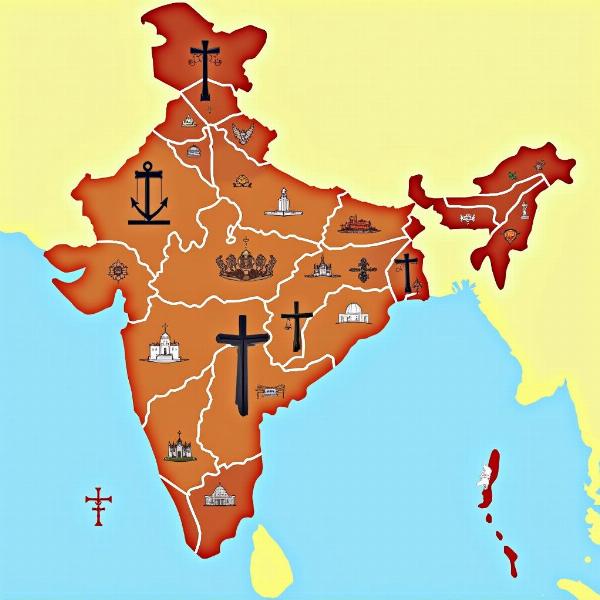Proselytise meaning in Hindi revolves around the concept of धर्म परिवर्तन (dharm parivartan), which literally translates to “religious conversion.” Understanding the nuances of this term, its cultural implications, and various synonyms in Hindi requires a deep dive into the socio-religious fabric of India. This article explores the various facets of “proselytise meaning in Hindi,” offering a comprehensive understanding of its usage, implications, and cultural context.
Understanding “Proselytise” in the Indian Context
While the English word “proselytise” carries a neutral connotation of attempting to convert someone to a different religion, belief, or opinion, its implications in India are often more complex. Given the country’s rich religious diversity and history of religious sensitivities, the act of proselytising can be a delicate issue. It often evokes images of forceful conversions, historical injustices, and social tensions. Therefore, understanding the cultural context is crucial when discussing “proselytise meaning in Hindi.”
Various Hindi Equivalents of “Proselytise”
Several Hindi words capture the essence of “proselytise,” each with its own subtle nuances:
- धर्म परिवर्तन कराना (Dharm parivartan karana): This is the most direct translation, meaning “to cause religious conversion.”
- मत परिवर्तन कराना (Mat parivartan karana): This refers to converting someone to a different opinion or belief, not necessarily religious.
- प्रचार करना (Prachar karna): While primarily meaning “to propagate” or “to spread,” this word can also imply proselytising, especially in a religious context.
- फुसलाना (Phusalana): This carries a negative connotation, suggesting enticing or coaxing someone to change their religion through deceptive means.
Cultural Sensitivities and Legal Ramifications
India’s constitution guarantees freedom of religion, including the right to propagate one’s religion. However, the line between propagation and forceful conversion is often blurred, leading to legal and social controversies. Several states have enacted anti-conversion laws to curb what they perceive as fraudulent or coercive religious conversions.
Proselytising in Different Religious Traditions
Different religious traditions in India view proselytising differently. Some actively encourage it as a religious duty, while others are more passive. Understanding these differing perspectives is essential for navigating the complexities of “proselytise meaning in Hindi.”
What are the legal implications of proselytising in India?
The legal landscape surrounding proselytising in India is complex and varies by state. Some states have specific anti-conversion laws, while others rely on broader interpretations of existing laws.
How do different religions in India view proselytising?
Hinduism, Islam, Christianity, Sikhism, and Buddhism, among other religions, each have unique perspectives on proselytising, ranging from active encouragement to passive acceptance.
 Proselytising in Different Religious Traditions in India
Proselytising in Different Religious Traditions in India
Conclusion
“Proselytise meaning in Hindi” encompasses a range of nuances and cultural sensitivities. While the act of converting someone to a different religion is constitutionally protected, the methods employed often lead to controversy. Understanding the various Hindi equivalents of “proselytise,” the legal ramifications, and the differing perspectives of various religious traditions is crucial for navigating this complex issue.
FAQ
- What is the most common Hindi word for “proselytise”? Dharm parivartan karana (धर्म परिवर्तन कराना) is the most common and direct translation.
- Is proselytising illegal in India? While freedom of religion is guaranteed, forceful or fraudulent conversions are illegal in several states.
- What is the difference between “prachar karna” and “phusalana” in the context of proselytising? “Prachar karna” means to propagate or spread, while “phusalana” implies enticing or coaxing deceptively.
- Why is proselytising a sensitive issue in India? India’s diverse religious landscape and history of religious tensions make proselytising a delicate matter.
- How does understanding the cultural context help in understanding “proselytise meaning in Hindi”? The cultural context provides insights into the nuances, sensitivities, and implications of the term beyond a simple translation.
- What are some examples of anti-conversion laws in India? Several states have enacted laws prohibiting forceful or fraudulent religious conversions.
- How can I learn more about the legal aspects of religious conversion in India? Consulting legal resources specializing in religious freedom and related laws can provide more information.
Meaning-Hindi.in is your premier destination for professional Hindi translation services. We offer a wide range of translation solutions, from business and legal documents to technical manuals and website localization. Our team of expert Hindi linguists ensures accurate and culturally sensitive translations, catering to diverse client needs. Whether you require certified translations, technical translations, or quick turnaround times, Meaning-Hindi.in is here to assist you. Contact us today at [email protected] or +91 11-4502-7584 to discuss your translation requirements.